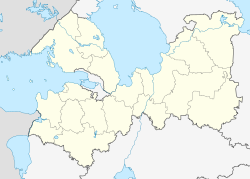| Pribylovo Kluchevoye/Pribylovo | |||||||
|---|---|---|---|---|---|---|---|
Ключевое/Прибылово | |||||||
| Pribylovo, Leningrad Oblast in Russia | |||||||
 Satellite imagery of Pribylovo air base | |||||||
| Site information | |||||||
| Type | Air Base | ||||||
| Owner | Ministry of Defence | ||||||
| Operator | Russian Aerospace Forces | ||||||
| Controlled by | 6th Air and Air Defence Forces Army | ||||||
| Location | |||||||
| Coordinates | 60°27′33″N28°44′42″E / 60.45917°N 28.74500°E | ||||||
| Site history | |||||||
| In use | - present | ||||||
| Airfield information | |||||||
| Elevation | 40 metres (131 ft) AMSL | ||||||
| |||||||
Pribylovo is an airbase of the Russian Aerospace Forces located near Pribylovo, Leningrad Oblast, Russia.
The base is home to the 549th Independent Helicopter Regiment. [1]


